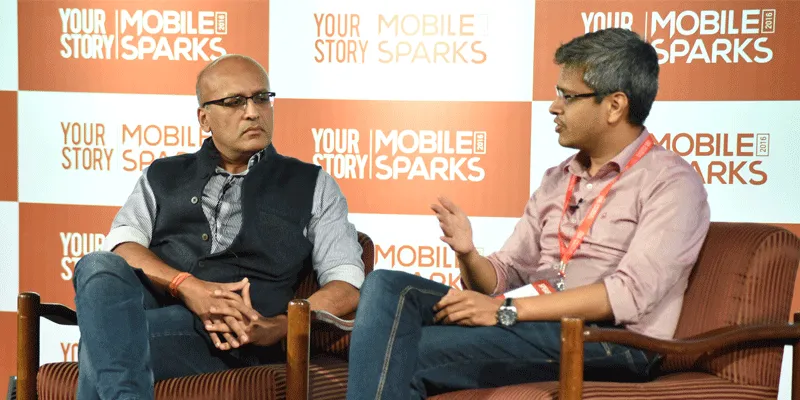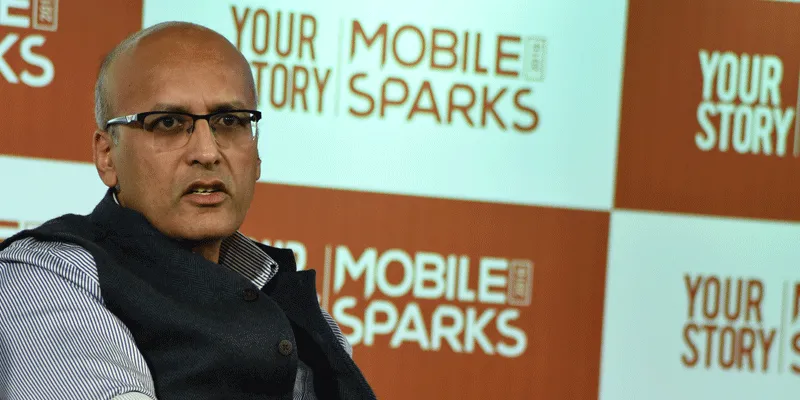Of VCs, entrepreneurs and the mythical world of unicorns – The Citrus Pay and Sequoia relationship
In a world that seems to revolve around valuations, funding, unicorns and winters, the Citrus exit story serves as a beacon of hope for entrepreneurs and investors alike. At MobileSparks 2016, Jitendra Gupta, Co-founder of Citrus Pay, and Mohit Bhatnagar, Managing Director of Sequoia Capital Advisors India, spoke candidly of exits, funding, and the entrepreneur and investor relationship.

Mohit believes that VCs have the easy part of the job. The hard work needs to be done by the entrepreneur. However, there are a few VCs that are actually willing to work with entrepreneurs during hard and tough times.
Working together during tough times
Speaking about how important it is for entrepreneurs and VCs to share a good rapport, Jitendra shares an anecdote from late last year,
In 2015, when the world was running towards the consumer business space, we strongly believed in our DNA and focused on merchants. And in September 2015, when one of our deals fell through, I called Mohit and asked him if he could invest at least $10 million, and the next day, the money was in the account.
That is a rare relationship; one shared by few investors and entrepreneurs in India. Mohit elaborated on this relationship by saying,
"Building a company throws up choices. Should you raise lots of money and become what the ecosystem deems popular, or stick to your DNA, even if it means that you are not in the limelight every day? When do you merge your company with a strategic partner and when do you build independently? When faced with these choices, founders need to dig deep to find the right answers."
The story of exits
Today, the startup ecosystem is pervaded by one question – When will we possibly see exits in India? Is there a secret sauce? Very few actually realise that the Indian startup ecosystem is in its very early stages. Mohit says,
“We have seen one funding cycle, and we need to see several different fund cycles before the LLPs see the returns. I have been doing this for over 10 years now, so I have had the chance to see some exits. Every time a company goes through an exit, the feeling is bittersweet. You put in great amount of time and effort in building relationships and working on the product and company, and then a part of you is going; but it is a cycle.”

The ecosystem is nevertheless maturing, and there is a growing level of acquisition interest. There is something to be said about organisations that are bought and not sold. When you start getting several inbound requests, the right one pops out. Jitendra explains,
“Ours was a natural progression; we never built a business for exits. For us, it started with general meetings of understanding the space and competition, and those meetings converted into real discussions, and one fine day, we got the idea of where the discussions were headed. When we got Mohit onboard, the discussion that started with one bottle of wine progressed to over seven.”
There is never any kind of recipe. There are several highs and lows in any entrepreneurial journey. Mohit says,
You need to time your discussions by understanding who your friends and enemies are. There isn’t an exact time frame for when a company should exit or when it shouldn’t. It is possibly one of the most distracting times and phases for an entrepreneur. It is best, therefore, to understand the space your company is actually in. It is something that you have no control over, so you need to be careful of the phase and how long you are in that mode for; ensure that you understand the reasons for the deal.
It is important to work on an exit dispassionately, keeping the focus on your business. While that is hard, it is what an entrepreneur needs to practice.
The drama of funding
With the increasing focus on funding and valuations, the focus on and joy of building the business is completely lost. Last year, the world was entirely focused on the amount of funding received by companies and what their valuations were.

Today, the world is changing. It has been proven time and again that if you have too much capital, gluttony can kill you. While many markets are seeing 'winner take all' scenarios play out, if you get your head in the game and forge on, things can turn out great. Making use of a soccer analogy, Mohit explains,
Statistically, it has been proven that in soccer, if you kick the ball in the centre, the chances of getting a goal are higher. But even the best of players hit it around the edges. And the reason they do that is because if you hit it in the centre and miss, the player is blamed, but along the edges, the player isn’t blamed as much. It is a human mindset - even the smartest guy doesn’t want to look like an idiot, and in a way, that is what happens with raising capital, because it is the cool thing to do.
Why not me?
The game of investment is actually relationship building. When a company pitches, they are pitching to an individual, and not a firm. And it all comes down to how you build a rapport with that particular investor. Sometimes, a connect just happens, and other times, it doesn't.
As important as it is to get the right co-founder, getting the right investor is almost as important. You need to be able to sit down and have a strong conversation with the investor despite any other deal.
“It isn’t about the valuation, it is about the relationship, and whether you can have a conversation with the person and be with the person,” says Jitendra.
It is also important that you build a team around you made up of the right people. Jitendra cites personal experience as proof of this; he says that, for the first two years of his journey, if he had focused on building the right team, things would’ve been better and easier. He says,
It is important to have a team in the early stages, the members of which are willing to put in the same amount of blood, sweat and tears as you are.
A big shoutout to all our sponsors – Sequoia Capital India Advisors , Qualcomm Ventures, VMAX, Shopclues, MapMyIndia.







